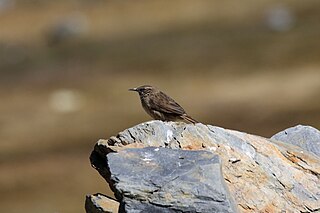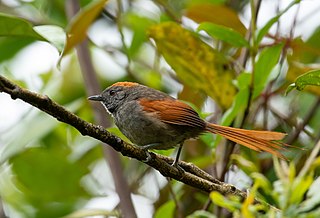
The fieldfare is a member of the thrush family Turdidae. It breeds in woodland and scrub in northern Europe and across the Palearctic. It is strongly migratory, with many northern birds moving south during the winter. It is a very rare breeder in Great Britain and Ireland, but winters in large numbers in the United Kingdom, Southern Europe, North Africa and the Middle East. It is omnivorous, eating a wide range of molluscs, insects and earthworms in the summer, and berries, grain and seeds in the winter.

The isabelline wheatear is a small passerine bird that was formerly classed as a member of the thrush family Turdidae, but is now more generally considered to be an Old World flycatcher in the family Muscicapidae. It is a migratory insectivorous bird. Its habitat is steppe and open countryside and it breeds in southern Russia and Central Asia to northern Pakistan, wintering in Africa and northwestern India. It is a very rare vagrant to western Europe.

The rufous-tailed scrub robin is a medium-sized member of the family Muscicapidae. Other common names include the rufous scrub robin, rufous bush chat, rufous bush robin and the rufous warbler. It breeds around the Mediterranean and east to Pakistan. It also breeds south of the Sahara from the Sahel region east to Somalia; these African birds are sometimes considered to be a separate species, the African scrub robin. It is partially migratory, wintering in Africa and India. This is a very rare visitor to northern Europe.

The streaked tuftedcheek is a passerine bird in the Furnariinae subfamily of the ovenbird family Furnariidae. It is found in Bolivia, Colombia, Ecuador, Peru, and Venezuela.

Carola's parotia, also known as Queen Carola's six-wired bird-of-paradise or Queen Carola's parotia, is a species of bird-of-paradise.

The slaty spinetail or slaty castlebuilder,, is a passerine bird in the Furnariinae subfamily of the ovenbird family Furnariidae. It is found from Honduras south to Peru.

The streak-throated canastero is a species of bird in the Furnariinae subfamily of the ovenbird family Furnariidae. It is found in Bolivia and Peru.

The ash-browed spinetail is a species of bird in the Furnariinae subfamily of the ovenbird family Furnariidae. It is found in Bolivia, Colombia, Ecuador, and Peru.

The masked flowerpiercer is a species of bird in the tanager family, Thraupidae. It is found in humid montane forest and scrub in Venezuela, Colombia, Ecuador, Peru and Bolivia. Flowerpiercers got their name from the fact that they have a sharp hook on the tip of their upper mandible which they use to slice open the base of flowers to get at the nectar.

The Andean tit-spinetail is a species of bird in the Furnariinae subfamily of the ovenbird family Furnariidae. It is found in Bolivia, Colombia, Ecuador, Peru, and Venezuela.

The spotted barbtail is a species of bird in the family Furnariidae. Its natural habitat is subtropical or tropical moist montane forest.

The rusty-winged barbtail is a species of bird in the Furnariinae subfamily of the ovenbird family Furnariidae. It is found in Colombia, Ecuador, Peru, and Venezuela.

The spectacled prickletail is a species of bird in the Furnariinae subfamily of the ovenbird family Furnariidae. It is found in Colombia, Ecuador, and Peru.

The dark-breasted spinetail is a species of bird in the Furnariinae subfamily of the ovenbird family Furnariidae. It is found in Bolivia, Brazil, Colombia, Ecuador, and Peru.

Azara's spinetail is a species of bird in the Furnariinae subfamily of the ovenbird family Furnariidae. It is found in Argentina, Bolivia, Colombia, Ecuador, Peru, and Venezuela.

The ruddy spinetail is a species of bird in the Furnariinae subfamily of the ovenbird family Furnariidae. It is found in Bolivia, Brazil, Colombia, Ecuador, Guyana, Peru, Suriname, Venezuela, and possibly Guyana.

The blackish-headed spinetail is a Vulnerable species of bird in the Furnariinae subfamily of the ovenbird family Furnariidae. It is found in Ecuador and Peru.

The striped treehunter is a species of bird in the Furnariinae subfamily of the ovenbird family Furnariidae. It is found in Bolivia, Colombia, Ecuador, Peru, and Venezuela.

The Guayaquil woodpecker is a species of bird in subfamily Picinae of the woodpecker family Picidae. It is found in Colombia, Ecuador and Peru.

The Pacific hornero is a species of bird in the Furnariinae subfamily of the ovenbird family Furnariidae. It is found in Colombia, Ecuador, and Peru.























